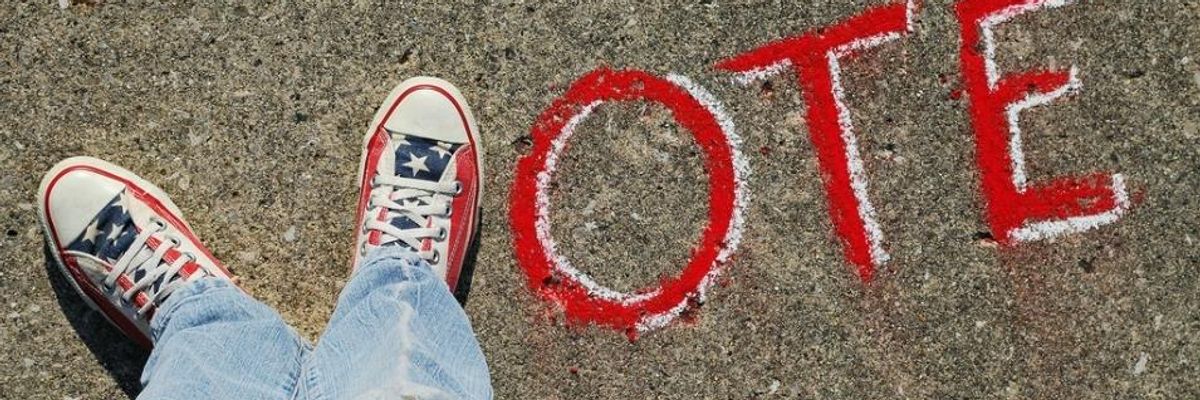With Election Day just around the corner, voting rights advocates warn that new laws ranging from photo ID requirements to early voting cutbacks to voter registration restrictions are disenfranchising student, minority, and elderly voters.
November 4 marks the first major federal election since the U.S. Supreme Court "put a dagger in the heart of the Voting Rights Act," as Congressman and civil rights leader John Lewis said last year. The Court's decision in Shelby County v. Holder stripped many communities of a key federal protection that required election officials to get government approval for voting changes; as a result, several states have pushed forward restrictive laws that studies show undermine the voting rights of American citizens.
A report released in September by the Government Accountability Office, for example, showed that voter ID laws decreased turnout to a greater degree among new, young, and African-American voters.
Earlier this week Bill Moyers and Michael Winship wrote explicitly: "The real reason for the laws is to lower turnout, to hold onto power by keeping those who in opposition from exercising their solemn right--to make it hard for minorities, poor folks, and students, among others, to participate in democracy's most cherished act."
On Wednesday, Al Jazeera Americareported on a 27-state "crusade against voter fraud" that "threatens a massive purge of voters from the rolls." The Interstate Crosscheck program, used by election officials to identify suspected double voters, is in fact scrubbing African-Americans, Asian-Americans, and Hispanics from the voter rolls, the publication's six-month investigation found.
"Millions, especially black, Hispanic and Asian-American voters, are at risk. Already, tens of thousands have been removed in at least one battleground state, and the numbers are expected to climb," Greg Palast wrote for Al Jazeera America. "The three states' lists are heavily weighted with names such as Jackson, Garcia, Patel and Kim -- ones common among minorities, who vote overwhelmingly Democratic...If even a fraction of those names are blocked from voting or purged from voter rolls, it could alter the outcome of next week's electoral battle for control of the U.S. Senate--and perhaps prove decisive in the 2016 presidential vote count."
"It's Jim Crow all over again," 91-year-old Rev. Joseph Lowery, who co-founded the Southern Christian Leadership Conference with Martin Luther King, Jr., told Palast.
Voter ID laws are already having a chilling effect in Texas. On Friday, the Brennan Center published actual stories of voters in Texas who have experienced difficulty participating in the democratic process. One young registered voter was misinformed and told that he could not vote because his ID had expired--but because it had expired less than 60 days previous, he should have been allowed to cast his ballot.
In another case, a man "was not allowed to vote with his expired license even though he had a Texas ID with his picture on it, his voter registration card, and even his birth certificate."
"In many cases, Texas failed these voters twice--first by requiring identification they did not have, and second by not training election officials to help them navigate the rules," the Center stated.
The nonpartisan voter advocacy coalition Election Protection on Thursday announced a radio advertisement campaign (mp3), airing in English and Spanish, focused on informing Texas voters about their rights.
"Recent changes by state courts and the Supreme Court have left voters in Texas confused and without key protections once afforded by the Voting Rights Act," said Barbara Arnwine, President and Executive Director of the Lawyers' Committee for Civil Rights Under Law and one of the Election Protection coalition members. "The new Voter ID requirement will potentially disenfranchise more than 600,000 registered Texas voters who do not have the required photo ID, and most of the affected voters are African American, Latino and low-income."
Election Protection is encouraging anyone who experiences problems voting to call: 1-866-OUR-VOTE (1-866-687-8683).
